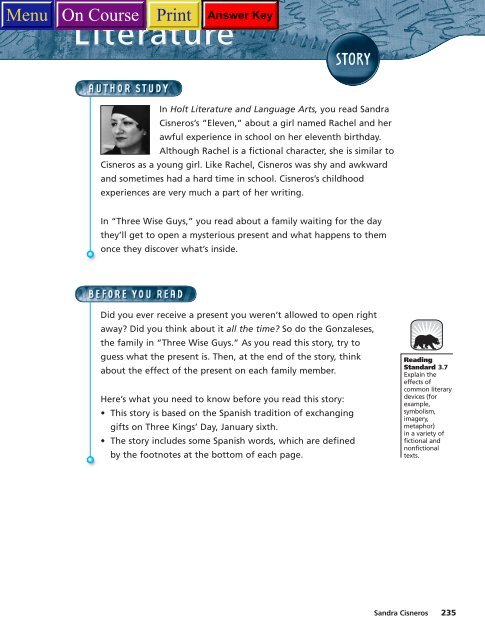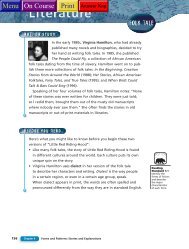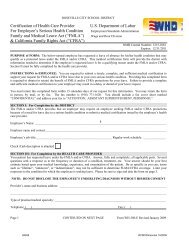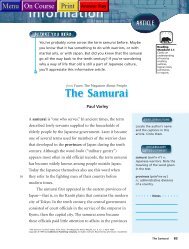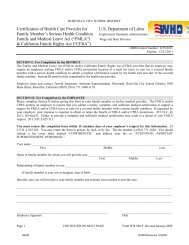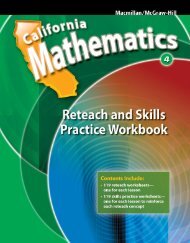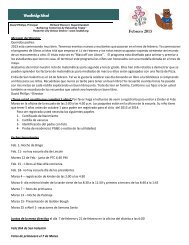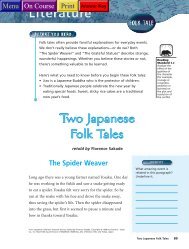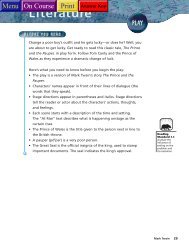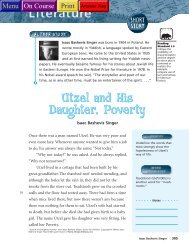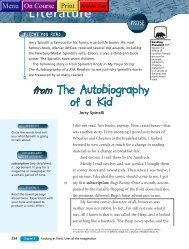In Holt Literature and Language Arts, you read Sandra Cisneros's ...
In Holt Literature and Language Arts, you read Sandra Cisneros's ...
In Holt Literature and Language Arts, you read Sandra Cisneros's ...
Create successful ePaper yourself
Turn your PDF publications into a flip-book with our unique Google optimized e-Paper software.
<strong>In</strong> <strong>Holt</strong> <strong>Literature</strong> <strong>and</strong> <strong>Language</strong> <strong>Arts</strong>, <strong>you</strong> <strong>read</strong> S<strong>and</strong>ra<br />
Cisneros’s “Eleven,” about a girl named Rachel <strong>and</strong> her<br />
awful experience in school on her eleventh birthday.<br />
Although Rachel is a fictional character, she is similar to<br />
Cisneros as a <strong>you</strong>ng girl. Like Rachel, Cisneros was shy <strong>and</strong> awkward<br />
<strong>and</strong> sometimes had a hard time in school. Cisneros’s childhood<br />
experiences are very much a part of her writing.<br />
<strong>In</strong> “Three Wise Guys,” <strong>you</strong> <strong>read</strong> about a family waiting for the day<br />
they’ll get to open a mysterious present <strong>and</strong> what happens to them<br />
once they discover what’s inside.<br />
Did <strong>you</strong> ever receive a present <strong>you</strong> weren’t allowed to open right<br />
away? Did <strong>you</strong> think about it all the time? So do the Gonzaleses,<br />
the family in “Three Wise Guys.” As <strong>you</strong> <strong>read</strong> this story, try to<br />
guess what the present is. Then, at the end of the story, think<br />
about the effect of the present on each family member.<br />
Here’s what <strong>you</strong> need to know before <strong>you</strong> <strong>read</strong> this story:<br />
• This story is based on the Spanish tradition of exchanging<br />
gifts on Three Kings’ Day, January sixth.<br />
• The story includes some Spanish words, which are defined<br />
by the footnotes at the bottom of each page.<br />
Reading<br />
St<strong>and</strong>ard 3.7<br />
Explain the<br />
effects of<br />
common literary<br />
devices (for<br />
example,<br />
symbolism,<br />
imagery,<br />
metaphor)<br />
in a variety of<br />
fictional <strong>and</strong><br />
nonfictional<br />
texts.<br />
S<strong>and</strong>ra Cisneros 235
Actually, Dia de los Reyes<br />
means “Day of the Kings.”<br />
The kings were Magi, or<br />
wise men.<br />
Notice the superscript<br />
numbers (the raised<br />
numbers) next to Spanish<br />
words. These numbers are<br />
references to the footnotes<br />
at the bottom of the pages.<br />
Why are these footnotes<br />
important in this story?<br />
Find <strong>and</strong> underline three<br />
examples of imagery in this<br />
paragraph. What does this<br />
imagery add to the story?<br />
S<strong>and</strong>ra Cisneros<br />
236 Chapter 6 Looking at Texts: Uses of the Imagination<br />
10<br />
20<br />
The big box came marked “Do Not Open till Xmas,” but<br />
the mama said not until the Day of the Three Kings. Not<br />
until Dia de los Reyes, the sixth of January, do <strong>you</strong> hear?<br />
That is what the mama said exactly, only she said it all in<br />
Spanish. Because in Mexico where she was raised, it is the<br />
custom for boys <strong>and</strong> girls to receive their presents on<br />
January sixth, <strong>and</strong> not Christmas, even though they were<br />
living on the Texas side of the river1 now. Not until the<br />
sixth day of January.<br />
Yesterday the mama had risen in the dark same as<br />
always to reheat the coffee in a tin saucepan <strong>and</strong> warm the<br />
breakfast tortillas. 2 The papa had gotten up coughing <strong>and</strong><br />
spitting up the night, complaining how the evening before<br />
the buzzing of the chicharras3 had kept him from sleeping.<br />
By the time the mama had the house smelling of oatmeal<br />
<strong>and</strong> cinnamon, the papa would be gone to the fields, the<br />
sun al<strong>read</strong>y tangled in the trees <strong>and</strong> the urracas4 screeching<br />
their rubber-screech cry. The boy Ruben <strong>and</strong> the girl<br />
Rosalinda would have to be shaken awake for school. The<br />
mama would give the baby Gilberto his bottle <strong>and</strong> then<br />
she would go back to sleep before getting up again to the<br />
chores that were always waiting. That is how the world<br />
had been.<br />
1. river n.: Rio Gr<strong>and</strong>e, which separates Mexico <strong>and</strong> Texas.<br />
2. tortillas (tôr •t≤√y¥s) n.: thin, flat cakes of cornmeal or flour.<br />
3. chicharras (¬≤ •¬ä√räs) n.: cicadas, insects that make a loud, highpitched<br />
sound.<br />
4. urracas (º •rä√käs) n.: magpies, black <strong>and</strong> white birds belonging to the<br />
crow family, known for their chattering.<br />
“Three Wise Guys” by S<strong>and</strong>ra Cisneros. Copyright © 1990 by S<strong>and</strong>ra Cisneros. First published by Vista<br />
Magazine, December 23, 1990. All rights reserved. Reprinted by permission of Susan Bergholz Literary<br />
Services, New York.
30<br />
40<br />
50<br />
But today the big box had arrived. When the boy<br />
Ruben <strong>and</strong> the girl Rosalinda came home from school, it<br />
was al<strong>read</strong>y sitting in the living room in front of the<br />
television set that no longer worked. Who had put it there?<br />
Where had it come from? A box covered with red paper<br />
with green Christmas trees <strong>and</strong> a card on top that said<br />
“Merry Christmas to the Gonzales Family. Frank, Earl, <strong>and</strong><br />
Dwight Travis. P.S. Do Not Open till Xmas.” That’s all.<br />
Two times the mama was made to come into the living<br />
room, first to explain to the children <strong>and</strong> later to their<br />
father how the brothers Travis had arrived in the blue<br />
pickup, <strong>and</strong> how it had taken all three of those big men to<br />
lift the box off the back of the truck <strong>and</strong> bring it inside, <strong>and</strong><br />
how she had had to nod <strong>and</strong> say thank-<strong>you</strong> thank-<strong>you</strong><br />
thank-<strong>you</strong> over <strong>and</strong> over because those were the only words<br />
she knew in English. Then the brothers Travis had nodded<br />
as well, the way they always did when they came <strong>and</strong><br />
brought the boxes of clothes, or the turkey each November,<br />
or the canned ham on Easter, ever since the children had<br />
begun to earn high grades at the school where Dwight<br />
Travis was the principal.<br />
But this year the Christmas box was bigger than usual.<br />
What could be in a box so big? The boy Ruben <strong>and</strong> the girl<br />
Rosalinda begged all afternoon to be allowed to open it,<br />
<strong>and</strong> that is when the mama had said the sixth of January,<br />
the Day of the Three Kings. Not a day sooner.<br />
It seemed the weeks stretched themselves wider <strong>and</strong><br />
wider since the arrival of the big box. The mama got used<br />
to sweeping around it because it was too heavy for her to<br />
push in a corner. But since the television no longer worked<br />
ever since the afternoon the children had poured iced tea<br />
through the little grates in the back, it really didn’t matter if<br />
• • • • • • Notes • • • • • •<br />
Why do the brothers bring<br />
clothes <strong>and</strong> food on holidays?<br />
What can <strong>you</strong> infer<br />
about the family’s financial<br />
status?<br />
Some sentences within the<br />
boxed passage are long.<br />
Practice <strong>read</strong>ing the passage<br />
aloud, <strong>and</strong> pay special attention<br />
to the long sentences.<br />
Notice where the commas<br />
are, <strong>and</strong> use them as a signal<br />
to pause. Practice <strong>read</strong>ing at<br />
a rate that is not too fast<br />
<strong>and</strong> not too slow.<br />
S<strong>and</strong>ra Cisneros 237
obstructed (¥b •struk√tid) v.:<br />
blocked.<br />
distract (di •strakt√) v.: draw<br />
attention away from;<br />
sidetrack.<br />
simplicity (sim •plis√¥ •t≤) n.:<br />
absence of complexity;<br />
plainness.<br />
Replace the word simplicity<br />
with the word plainness in<br />
the sentence. Is the sentence<br />
as effective? Why or why<br />
not?<br />
238 Chapter 6 Looking at Texts: Uses of the Imagination<br />
60<br />
70<br />
80<br />
the box obstructed the view. Visitors that came inside<br />
the house were told <strong>and</strong> told again the story of how the<br />
box had arrived, <strong>and</strong> then each was made to guess what<br />
was inside.<br />
It was the comadre5 Elodia who suggested over coffee<br />
one afternoon that the big box held a portable washing<br />
machine that could be rolled away when not in use, the<br />
kind she had seen in her Sears Roebuck catalog. The mama<br />
said she hoped so because the wringer washer she had used<br />
for the last ten years had finally gotten tired <strong>and</strong> quit. These<br />
past few weeks she had had to boil all the clothes in the big<br />
pot she used for cooking the Christmas tamales. 6 Yes. She<br />
hoped the big box was a portable washing machine. A<br />
washing machine, even a portable one, would be good.<br />
But the neighbor man Cayetano said, what foolishness,<br />
comadre. Can’t <strong>you</strong> see the box is too small to hold a<br />
washing machine, even a portable one. Most likely God<br />
has heard <strong>you</strong>r prayers <strong>and</strong> sent a new color TV. With a<br />
good antenna <strong>you</strong> could catch all the Mexican soap operas,<br />
the neighbor man said. You could distract <strong>you</strong>rself with the<br />
complicated troubles of the rich <strong>and</strong> then give thanks to<br />
God for the blessed simplicity of <strong>you</strong>r poverty. A new TV<br />
would surely be the end to all <strong>you</strong>r miseries.<br />
Each night when the papa came home from the fields,<br />
he would sp<strong>read</strong> newspapers on the cot in the living room,<br />
where the boy Ruben <strong>and</strong> the girl Rosalinda slept, <strong>and</strong> sit<br />
facing the big box in the center of the room. Each night he<br />
imagined the box held something different. The day before<br />
yesterday he guessed a new record player. Yesterday an ice<br />
chest filled with beer. Today the papa sat with his bottle of<br />
5. comadre (ko •mä√dr†) n.: woman who is a relative or close friend of<br />
the family (the “co-mother”).<br />
6. tamales (t¥ •mä√l≤z) n.: meat <strong>and</strong> peppers cooked in a corn husk.
90<br />
100<br />
110<br />
beer, fanning himself with a magazine, <strong>and</strong> said in a voice<br />
as much a plea as a prophecy: air conditioner.<br />
But the boy Ruben <strong>and</strong> the girl Rosalinda were sure<br />
the big box was filled with toys. They had even punctured it<br />
in one corner with a pencil when their mother was busy<br />
cooking, but they could see nothing inside but blackness.<br />
Only the baby Gilberto remained uninterested in the<br />
contents of the big box <strong>and</strong> seemed each day more fascinated<br />
with the exterior of the box rather that the interior. One<br />
afternoon he tore off a fistful of paper, which he was<br />
chewing when his mother swooped him up with one arm,<br />
rushed him to the kitchen sink, <strong>and</strong> forced him to swallow<br />
h<strong>and</strong>fuls of lukewarm water in case the red dye of the<br />
wrapping paper might be poisonous.<br />
When Christmas Eve finally came, the family Gonzalez<br />
put on their good clothes <strong>and</strong> went to Midnight Mass. They<br />
came home to a house that smelled of tamales <strong>and</strong> atole, 7<br />
<strong>and</strong> everyone was allowed to open one present before going<br />
to sleep. But the big box was to remain untouched until the<br />
sixth of January.<br />
On New Year’s Eve the house was filled with people,<br />
some related, some not, coming in <strong>and</strong> out. The friends of<br />
the papa came with bottles, <strong>and</strong> the mama set out a bowl of<br />
grapes to count off the New Year. That night the children<br />
did not sleep in the living-room cot as they usually did,<br />
because the living room was crowded with big-fannied<br />
ladies <strong>and</strong> fat-stomached men sashaying to the accordion<br />
music of the midget twins from McAllen. 8 <strong>In</strong>stead the<br />
children fell asleep on a lump of h<strong>and</strong>bags <strong>and</strong> crumpled<br />
suit jackets on top of the mama <strong>and</strong> the papa’s bed,<br />
dreaming of the contents of the big box.<br />
7. atole (ä •t£√l†) n.: broth made from corn flour.<br />
8. McAllen: Texas city near the Mexican border.<br />
What do <strong>you</strong> learn in lines<br />
60–89 about each person<br />
based on what he or she<br />
hopes is inside the box?<br />
Underline the images in lines<br />
100–116 that help <strong>you</strong> imagine<br />
what the house was like<br />
on the holidays.<br />
S<strong>and</strong>ra Cisneros 239
Soon the box will be opened.<br />
Make a prediction about<br />
what <strong>you</strong> think is inside.<br />
Then <strong>read</strong> on <strong>and</strong> see if<br />
<strong>you</strong>r prediction is right.<br />
“Coughing up the night<br />
before” in lines 129–130 is<br />
not literally true. What does<br />
this figure of speech mean?<br />
120<br />
130<br />
140<br />
240 Chapter 6 Looking at Texts: Uses of the Imagination<br />
Finally, the fifth of January. And the boy Ruben <strong>and</strong><br />
the girl Rosalinda could hardly sleep. All night they<br />
whispered last-minute wishes. The boy thought perhaps if<br />
the big box held a bicycle, he would be the first to ride it,<br />
since he was the oldest. This made his sister cry until the<br />
mama had to yell from her bedroom on the other side of<br />
the plastic curtains, Be quiet or I’m going to give <strong>you</strong> each<br />
the stick, which sounds worse in Spanish than it does in<br />
English. Then no one said anything. After a very long time,<br />
long after they heard the mama’s wheezed breathing <strong>and</strong><br />
the papa’s piped snoring, the children closed their eyes <strong>and</strong><br />
remembered nothing.<br />
The papa was al<strong>read</strong>y in the bathroom coughing up<br />
the night before from his throat when the urracas began<br />
their clownish chirping. The boy Ruben awoke <strong>and</strong> shook<br />
his sister. The mama, frying the potatoes <strong>and</strong> beans for<br />
breakfast, nodded permission for the box to be opened.<br />
With a kitchen knife the boy Ruben cut a careful edge<br />
along the top. The girl Rosalinda tore the Christmas<br />
wrapping with her fingernails. The papa <strong>and</strong> the mama<br />
lifted the cardboard flaps <strong>and</strong> everyone peered inside to<br />
see what it was the brothers Travis had brought them on<br />
the Day of the Three Kings.<br />
There were layers of balled newspaper packed on top.<br />
When these had been cleared away the boy Ruben looked<br />
inside. The girl Rosalinda looked inside. The papa <strong>and</strong> the<br />
mama looked.<br />
This is what they saw: the complete Britannica Junior<br />
Encyclopaedia, twenty-four volumes in red imitation<br />
leather with gold-embossed letters, beginning with<br />
Volume 1, Aar–Bel <strong>and</strong> ending with Volume XXIV,<br />
Yel–Zyn. The girl Rosalinda let out a sad cry, as if her
150<br />
160<br />
170<br />
hair was going to be cut again. The boy Ruben pulled out<br />
Volume IV, Ded–Fem. There were many pictures <strong>and</strong> many<br />
words, but there were more words than pictures. The papa<br />
flipped through Volume XXII, but because he could not<br />
<strong>read</strong> English words, simply put the book back <strong>and</strong> grunted,<br />
What can we do with this? No one said anything, <strong>and</strong><br />
shortly after, the screen door slammed.<br />
Only mama knew what to do with the contents of the<br />
big box. She withdrew Volumes VI, VII, <strong>and</strong> VIII, marched<br />
off to the dinette set in the kitchen, placed two on<br />
Rosalinda’s chair so she could better reach the table, <strong>and</strong><br />
put one underneath the plant st<strong>and</strong> that danced.<br />
When the boy <strong>and</strong> girl returned from school that<br />
day, they found the books stacked into squat pillars against<br />
one living-room wall <strong>and</strong> a board placed on top. On this<br />
were arranged several plastic doilies <strong>and</strong> framed family<br />
photographs. The rest of the volumes the baby Gilberto<br />
was playing with, <strong>and</strong> he was al<strong>read</strong>y rubbing his sore gums<br />
along the corners of Volume XIV.<br />
The girl Rosalinda also grew interested in the books.<br />
She took out her colored pencils <strong>and</strong> painted blue on the<br />
eyelids of all the illustrations of women <strong>and</strong> with a red<br />
pencil dipped in spit she painted their lips <strong>and</strong> fingernails<br />
red-red. After a couple of days, when all the pictures of<br />
women had been colored in this manner, she began to cut<br />
out some of the prettier pictures <strong>and</strong> paste them on looseleaf<br />
paper.<br />
One volume suffered from being exposed to the rain<br />
when the papa improvised a hat during a sudden shower.<br />
He forgot it on the hood of the car when he drove off.<br />
When the children came home from school they set it on<br />
What does each person do<br />
with the gift? See lines<br />
156–177.<br />
The plant st<strong>and</strong> in line 160<br />
is personified—that is, it is<br />
spoken of as if it were<br />
human. What is the plant<br />
st<strong>and</strong> doing that only<br />
humans can do?<br />
S<strong>and</strong>ra Cisneros 241
Pause at line 202. What<br />
discovery has Ruben made?<br />
What could the colors in<br />
the final lines of the story<br />
symbolize?<br />
What do <strong>you</strong> think the story’s<br />
title means? Could it have<br />
more than one meaning?<br />
180<br />
190<br />
200<br />
242 Chapter 6 Looking at Texts: Uses of the Imagination<br />
the porch to dry. But the pages puffed up <strong>and</strong> became so<br />
fat, the book was impossible to close.<br />
Only the boy Ruben refused to touch the books. For<br />
several days he avoided the principal because he didn’t<br />
know what to say in case Mr. Travis were to ask how they<br />
were enjoying the Christmas present.<br />
On the Saturday after New Year’s the mama <strong>and</strong> the<br />
papa went into town for groceries <strong>and</strong> left the boy in<br />
charge of watching his sister <strong>and</strong> baby brother. The girl<br />
Rosalinda was stacking books into spiral staircases <strong>and</strong><br />
making her paper dolls descend them in a fancy manner.<br />
Perhaps the boy Ruben would not have bothered to<br />
open the volume left on the kitchen table if he had not seen<br />
his mother wedge her name-day corsage9 in its pages. On<br />
the page where the mama’s carnation lay pressed between<br />
two pieces of Kleenex was a picture of a dog in a space ship.<br />
“First dog in space” the caption said. The boy turned to<br />
another page <strong>and</strong> <strong>read</strong> where cashews came from. And then<br />
about the man who invented the guillotine. And then about<br />
Bengal tigers. And about clouds. All afternoon the boy <strong>read</strong>,<br />
even after the mama <strong>and</strong> the papa came home. Even after<br />
the sun set, until the mama said time to sleep <strong>and</strong> put the<br />
light out.<br />
<strong>In</strong> their bed on the other side of the plastic curtain the<br />
mama <strong>and</strong> the papa slept. Across from them in the crib<br />
slept the baby Gilberto. The girl Rosalinda slept on her end<br />
of the cot. But the boy Ruben watched the night sky turn<br />
from violet. To blue. To gray. And then from gray. To blue.<br />
To violet once again.<br />
9. name-day corsage (kôr •sä¤√) n.: flower or a bunch of flowers that are<br />
worn to celebrate the feast day of the saint for whom a person is<br />
named.
Symbolism A symbol is a thing that represents something besides<br />
itself. What do <strong>you</strong> think the encyclopedias are symbolic of? Write<br />
<strong>you</strong>r answer in two or three sentences.<br />
Personal Word List You probably came across some new words in<br />
this story. They may have been Spanish words or English words <strong>you</strong><br />
were unfamiliar with. Choose five words, <strong>and</strong> add them to <strong>you</strong>r<br />
Personal Word List. Write an English word that means the same thing<br />
as each Spanish word.<br />
Personal Reading Log Did <strong>you</strong> enjoy this story? Explain why or why<br />
not in <strong>you</strong>r Personal Reading Log. Give <strong>you</strong>rself 4 points on the<br />
Reading Meter for completing it.<br />
Checklist for St<strong>and</strong>ards Mastery You’ve finished <strong>read</strong>ing <strong>and</strong><br />
responding to another selection. Use the Checklist for St<strong>and</strong>ards<br />
Mastery to determine how far <strong>you</strong>’ve come in mastering the st<strong>and</strong>ards.<br />
S<strong>and</strong>ra Cisneros 243
Three Wise Guys <strong>In</strong>teractive Reading, page 236<br />
Go Beyond a Literary Text<br />
Author Profile Use <strong>you</strong>r library <strong>and</strong> the <strong>In</strong>ternet to find out<br />
more about S<strong>and</strong>ra Cisneros. As <strong>you</strong> find information, enter it<br />
on the author-profile chart below.<br />
Profile of:<br />
Date of Birth:<br />
Place of Birth:<br />
Parents:<br />
S<strong>and</strong>ra Cisneros<br />
Other Family Members:<br />
Description of Her Childhood <strong>and</strong> Childhood <strong>In</strong>terests:<br />
Education:<br />
Famous Books or Other Works:<br />
Author Quotation:<br />
244 Chapter 6<br />
Looking at Texts: Uses of the Imagination
Build <strong>In</strong>dependence Through <strong>In</strong>teractive Selections<br />
Three Wise Guys<br />
S<strong>and</strong>ra Cisneros ■ page 236<br />
(<strong>In</strong>teractive Reading, pages 236–261)<br />
■ Tell students that they are going to <strong>read</strong> “Three Wise Guys,”<br />
another story by S<strong>and</strong>ra Cisneros. Encourage students to recall<br />
what they liked about Cisneros’s story “Eleven.”<br />
■ Have students <strong>read</strong> the Author Study <strong>and</strong> the Before You Read<br />
notes. Tell students that in this story, three brothers bring the<br />
Gonzales family a gift for Three Kings’ Day. Based on what they’ve<br />
learned about this holiday, ask students to speculate about why<br />
Cisneros gave the story this title.<br />
■ Read the beginning of the story aloud, until the first “What <strong>and</strong><br />
Why?” note.<br />
■ Find <strong>and</strong> identify for students one example of imagery in the paragraph.<br />
Direct students to underline the example <strong>you</strong> identify. Have<br />
students find <strong>and</strong> underline two additional examples on their own.<br />
■ Model how <strong>you</strong> might respond to the second part of the note:<br />
“The use of this imagery really helps me ‘hear,’ ‘smell,’ <strong>and</strong> ‘see’<br />
what is happening. The images make the scene seem real.”<br />
■ Have students <strong>read</strong> the rest of the story independently. Remind<br />
them to note their responses to the sidenotes in their books.<br />
■ After students have finished <strong>read</strong>ing, divide the class into small<br />
groups, <strong>and</strong> have them discuss their responses.<br />
■ Bring the class back together, <strong>and</strong> direct students to the Fluency<br />
note. Have several students <strong>read</strong> the fluency passage aloud.<br />
■ Have students add the title of this story to their Personal Reading<br />
Logs.<br />
■ Use the Vocabulary Check on Teacher’s Edition page 80 to evaluate<br />
mastery of the vocabulary st<strong>and</strong>ard.<br />
■ Use the Comprehension Check on Teacher’s Edition page 81 to<br />
evaluate mastery of the literary st<strong>and</strong>ard.<br />
■ Have students complete the Author Profile on <strong>In</strong>teractive Reading<br />
page 244 to learn more about S<strong>and</strong>ra Cisneros.<br />
DIFFERENTIATING INSTRUCTION<br />
Three Wise Guys<br />
■ Learners Having Difficulty<br />
This selection contains some<br />
Spanish words. Before students<br />
<strong>read</strong> the selection independently,<br />
ask those who are<br />
conversant in Spanish to <strong>read</strong><br />
these Spanish words aloud<br />
<strong>and</strong> define them for non-<br />
Spanish speakers.<br />
■ Benchmark Students The<br />
selection vocabulary <strong>and</strong> some<br />
of the other words used in the<br />
text may pose problems for<br />
benchmark students.<br />
Encourage students to use the<br />
Vocabulary Development <strong>and</strong><br />
Word Knowledge sidenotes as<br />
they <strong>read</strong>.<br />
■ Advanced Students Students<br />
will enjoy guessing what is in<br />
the box. Before they finish<br />
<strong>read</strong>ing the story, ask them to<br />
fill out prediction cards, writing<br />
their predictions on one<br />
side <strong>and</strong> their reasons for<br />
making the prediction on the<br />
other. Have small groups<br />
share <strong>and</strong> discuss their cards.<br />
After they finish the story, students<br />
can see if their predictions<br />
were correct.<br />
READING OPTION<br />
All students will enjoy hearing<br />
this selection <strong>read</strong> aloud on the<br />
Audio CD before they <strong>read</strong> it<br />
independently.<br />
TEACHER TO TEACHER<br />
Have students in small groups<br />
discuss the questions the selection<br />
raises. Ask the groups to<br />
share personal stories about<br />
presents with mysterious contents.<br />
Then, have the groups<br />
share their responses.<br />
Chapter 6 75
Name ______________________________ Class _____________ Date _____________<br />
Three Wise Guys<br />
■ <strong>In</strong>teractive Reading, page 236<br />
Reading St<strong>and</strong>ard 1.5 Underst<strong>and</strong> <strong>and</strong> explain “shades of<br />
meaning” in related words.<br />
80 <strong>In</strong>teractive Reading<br />
obstructed, verb<br />
distract, verb<br />
simplicity, noun<br />
Vocabulary Development<br />
Vocabulary Check<br />
A. Words in Context<br />
Use words from the word box to complete the paragraph. Use each word only once.<br />
I couldn’t see the box because it was (1) _______________ by Papa’s hulking<br />
form in the doorway. “What do <strong>you</strong> want, bonita?” he said. I started to plead, “Let<br />
me see! Let me see!” but he ignored my begging. Mama made breakfast, but the<br />
(2) _______________ of the meal—the usual fried b<strong>read</strong> sprinkled with sugar—did<br />
nothing to (3) _______________ me from the mystery of the box.<br />
B. Words with Similar Meanings<br />
Replace each boldface word with a vocabulary word that has a similar meaning. Then<br />
write a sentence in which <strong>you</strong> use the vocabulary word correctly.<br />
1. The large box blocked the view of the living room.<br />
2. Like a game, the box had the ability to sidetrack the<br />
children’s attention.<br />
3. The family’s life has a certain plainness to it.<br />
blocked<br />
draw attention away from; sidetrack<br />
absence of complexity; plainness<br />
Copyright © by <strong>Holt</strong>, Rinehart <strong>and</strong> Winston. All rights reserved.
Copyright © by <strong>Holt</strong>, Rinehart <strong>and</strong> Winston. All rights reserved.<br />
Name ______________________________ Class _____________ Date _____________<br />
Three Wise Guys<br />
■ <strong>In</strong>teractive Reading, page 236<br />
Reading St<strong>and</strong>ard 3.7 Explain the effects of common literary<br />
devices in a variety of fictional <strong>and</strong> nonfictional texts.<br />
figurative language<br />
imagery<br />
symbol<br />
Academic Vocabulary<br />
Comprehension Check<br />
word or phrase that describes one thing in terms of<br />
something else <strong>and</strong> is not literally true<br />
language that appeals to the senses<br />
person, place, thing, or event that has its<br />
own meaning <strong>and</strong> st<strong>and</strong>s for something beyond itself<br />
A. Circle the letter of the best response to each item below.<br />
1. Which of the following is not an example of figurative language?<br />
A sun tangled in the trees<br />
B coughing <strong>and</strong> spitting up the night<br />
C weeks stretched themselves wider <strong>and</strong> wider<br />
D sp<strong>read</strong> newspapers on the cot<br />
2. Which of the following is an example of imagery?<br />
F a lump of h<strong>and</strong>bags <strong>and</strong> crumpled suit jackets<br />
G troubles of the rich<br />
H the house was filled with people<br />
J no one said anything<br />
3. Which of the following uses imagery to help us hear something?<br />
A a bowl of grapes C mama’s wheezed breathing<br />
B books stacked in squat pillars D a house that smelled of tamales<br />
4. <strong>In</strong> this story the encyclopedia could be seen as a symbol of—<br />
F books <strong>and</strong> pictures H money <strong>and</strong> luxury<br />
G poverty <strong>and</strong> simplicity J learning <strong>and</strong> knowledge<br />
B. Re-<strong>read</strong> the descriptions of Christmas Eve <strong>and</strong> New Year’s Eve. Write down the<br />
sensory images (sound, taste, smell, sight, touch) that helped <strong>you</strong> imagine these<br />
scenes.<br />
Chapter 6 81
Chapter 6<br />
Practice Read: Who Was Cleopatra?<br />
Vocabulary Check, page 78<br />
A: 1. feuds<br />
2. deposed<br />
3. ambitious<br />
4. dynamic<br />
5. jeered<br />
B: 1. greedy<br />
2. feuds<br />
3. jeered<br />
4. toppled<br />
5. dynamic<br />
Comprehension Check, page 79<br />
A: 1. D<br />
2. G<br />
3. C<br />
4. F<br />
B: Students’ responses will vary. Examples:<br />
Cleopatra was like a snake. Cleopatra was<br />
a tiger.<br />
Three Wise Guys<br />
Vocabulary Check, page 80<br />
A: 1. obstructed<br />
2. simplicity<br />
3. distract<br />
B: 1. obstructed Example: Our access to the door<br />
was obstructed by a mean-looking dog.<br />
2. distract Example: The clown on the sidewalk<br />
distracted all the passersby.<br />
3. simplicity Example: The pattern of the<br />
curtains had such a simplicity to it.<br />
Comprehension Check, page 81<br />
A: 1. D<br />
2. F<br />
3. C<br />
4. J<br />
B: The house smelled of tamales <strong>and</strong> tacos. [smell]<br />
The living room was crowded with big-fannied<br />
ladies <strong>and</strong> fat-stomached men sashaying to the<br />
accordion music. [sight <strong>and</strong> sound] The children<br />
fell asleep on a lump of h<strong>and</strong>bags. [sight]<br />
The Ancient Library of Alex<strong>and</strong>ria<br />
Vocabulary Check, page 82<br />
A: 1. universal<br />
2. deposited<br />
3. stationary<br />
B: 1. fragrance<br />
2. odor<br />
3. scrawny<br />
4. slender<br />
Comprehension Check, page 83<br />
A: 1. A<br />
2. J<br />
3. B<br />
B: He asserted that Earth was a sphere. He used<br />
geometric calculations <strong>and</strong> measured the lengths<br />
of shadows cast by sticks. He estimated that<br />
Earth’s diameter was 7,850 miles.<br />
from The Autobiography of a Kid<br />
Vocabulary Check, page 84<br />
A: 1. blithely<br />
2. subscription<br />
3. curriculum<br />
B: 1. ridiculous<br />
2. bl<strong>and</strong><br />
3. liked<br />
4. clever<br />
Comprehension Check, page 85<br />
A: 1. B<br />
2. H<br />
3. A<br />
4. J<br />
B: Students may choose: “And what about words,<br />
which, packed together, made up a book as cells<br />
made up my body? I liked them.” “Whether I<br />
knew it or not, words were claiming me.” “That<br />
[the word ‘bum ticker’] tickled me to no end.”<br />
Answer Key 115
for use with<br />
<strong>Holt</strong> <strong>Literature</strong> <strong>and</strong> <strong>Language</strong> <strong>Arts</strong>,<br />
page 364<br />
Eleven<br />
<strong>In</strong>teract with a Literary Text<br />
<strong>In</strong> <strong>Holt</strong> <strong>Literature</strong> <strong>and</strong> <strong>Language</strong> <strong>Arts</strong>, <strong>you</strong> <strong>read</strong> S<strong>and</strong>ra<br />
Cisneros’s “Eleven,” about a girl named Rachel <strong>and</strong> her<br />
awful experience in school on her eleventh birthday.<br />
Although Rachel is a fictional character, she is similar to<br />
Cisneros as a <strong>you</strong>ng girl. Like Rachel, Cisneros was shy <strong>and</strong> awkward<br />
<strong>and</strong> sometimes had a hard time in school. Cisneros’s childhood<br />
Imagery Grid Imagery is language that appeals to the senses.<br />
Images describe sights, smells, tastes, sounds, <strong>and</strong> the way things feel<br />
when <strong>you</strong> touch them. Writers use imagery to help us share an<br />
experience. Fill in the imagery chart below with images that S<strong>and</strong>ra<br />
Cisneros uses throughout “Eleven.” Then answer the questions.<br />
Touch<br />
Sight<br />
experiences are very much a part of her writing.<br />
I squeeze them shut tight <strong>and</strong> bite<br />
down on my teeth real hard<br />
the red sweater is . . . like a big red<br />
mountain<br />
<strong>In</strong> “Three Wise Guys,” <strong>you</strong> <strong>read</strong> about a family waiting for the day<br />
they’ll get to open a mysterious present <strong>and</strong> what happens to them<br />
once they discover what’s inside.<br />
My face all hot<br />
my body shaking like when <strong>you</strong><br />
it’s hanging over the edge like a<br />
waterfall<br />
have the hiccups<br />
far away like a runaway balloon,<br />
like a tiny-o in the sky<br />
Did <strong>you</strong> ever receive a present <strong>you</strong> weren’t allowed to open right<br />
away? Did <strong>you</strong> think about it all the time? So do the Gonzaleses,<br />
the family in “Three Wise Guys.” As <strong>you</strong> <strong>read</strong> this story, try to<br />
guess what the present is. Then, at the end of the story, think<br />
about the effect of the present on each family member.<br />
Sound Taste Smell<br />
one sleeve of the<br />
sweater that smells<br />
rattling inside me like<br />
pennies in a tin B<strong>and</strong>-<br />
Reading<br />
St<strong>and</strong>ard 3.7<br />
Explain the<br />
effects of<br />
common literary<br />
devices (for<br />
example,<br />
symbolism,<br />
imagery,<br />
metaphor)<br />
in a variety of<br />
fictional <strong>and</strong><br />
nonfictional<br />
texts.<br />
like cottage cheese<br />
Aid box<br />
I can’t stop the little<br />
Here’s what <strong>you</strong> need to know before <strong>you</strong> <strong>read</strong> this story:<br />
• This story is based on the Spanish tradition of exchanging<br />
gifts on Three Kings’ Day, January sixth.<br />
• The story includes some Spanish words, which are defined<br />
by the footnotes at the bottom of each page.<br />
animal noises from<br />
coming out of me<br />
Questions<br />
1. Which sense from the diagram had the most images?<br />
sight <strong>and</strong> touch<br />
Chapter 6<br />
Pupil Pages 222–261<br />
2. Which had the least?<br />
taste<br />
3. Which image from the story do <strong>you</strong> like the most? Why?<br />
Answers will vary.<br />
Pupil Pages with Answers 237<br />
S<strong>and</strong>ra Cisneros 235<br />
234 Chapter 6 Looking at Texts: Uses of the Imagination
• • • • • • Notes • • • • • •<br />
But today the big box had arrived. When the boy<br />
Ruben <strong>and</strong> the girl Rosalinda came home from school, it<br />
was al<strong>read</strong>y sitting in the living room in front of the<br />
television set that no longer worked. Who had put it there?<br />
Where had it come from? A box covered with red paper<br />
with green Christmas trees <strong>and</strong> a card on top that said<br />
“Merry Christmas to the Gonzales Family. Frank, Earl, <strong>and</strong><br />
Dwight Travis. P.S. Do Not Open till Xmas.” That’s all.<br />
Two times the mama was made to come into the living<br />
room, first to explain to the children <strong>and</strong> later to their<br />
father how the brothers Travis had arrived in the blue<br />
pickup, <strong>and</strong> how it had taken all three of those big men to<br />
lift the box off the back of the truck <strong>and</strong> bring it inside, <strong>and</strong><br />
how she had had to nod <strong>and</strong> say thank-<strong>you</strong> thank-<strong>you</strong><br />
thank-<strong>you</strong> over <strong>and</strong> over because those were the only words<br />
she knew in English. Then the brothers Travis had nodded<br />
as well, the way they always did when they came <strong>and</strong><br />
brought the boxes of clothes, or the turkey each November,<br />
or the canned ham on Easter, ever since the children had<br />
begun to earn high grades at the school where Dwight<br />
Travis was the principal.<br />
But this year the Christmas box was bigger than usual.<br />
What could be in a box so big? The boy Ruben <strong>and</strong> the girl<br />
Rosalinda begged all afternoon to be allowed to open it,<br />
<strong>and</strong> that is when the mama had said the sixth of January,<br />
the Day of the Three Kings. Not a day sooner.<br />
It seemed the weeks stretched themselves wider <strong>and</strong><br />
wider since the arrival of the big box. The mama got used<br />
to sweeping around it because it was too heavy for her to<br />
push in a corner. But since the television no longer worked<br />
ever since the afternoon the children had poured iced tea<br />
through the little grates in the back, it really didn’t matter if<br />
238 <strong>In</strong>teractive Reading: Teacher’s Edition<br />
S<strong>and</strong>ra Cisneros<br />
30<br />
Why do the brothers bring<br />
clothes <strong>and</strong> food on holidays?<br />
What can <strong>you</strong> infer<br />
about the family’s financial<br />
status?<br />
The big box came marked “Do Not Open till Xmas,” but<br />
the mama said not until the Day of the Three Kings. Not<br />
until Dia de los Reyes, the sixth of January, do <strong>you</strong> hear?<br />
That is what the mama said exactly, only she said it all in<br />
Spanish. Because in Mexico where she was raised, it is the<br />
custom for boys <strong>and</strong> girls to receive their presents on<br />
January sixth, <strong>and</strong> not Christmas, even though they were<br />
living on the Texas side of the river1 now. Not until the<br />
sixth day of January.<br />
Yesterday the mama had risen in the dark same as<br />
always to reheat the coffee in a tin saucepan <strong>and</strong> warm the<br />
breakfast tortillas. 2 The papa had gotten up coughing <strong>and</strong><br />
spitting up the night, complaining how the evening before<br />
the buzzing of the chicharras3 had kept him from sleeping.<br />
By the time the mama had the house smelling of oatmeal<br />
<strong>and</strong> cinnamon, the papa would be gone to the fields, the<br />
sun al<strong>read</strong>y tangled in the trees <strong>and</strong> the urracas4 screeching<br />
their rubber-screech cry. The boy Ruben <strong>and</strong> the girl<br />
Rosalinda would have to be shaken awake for school. The<br />
mama would give the baby Gilberto his bottle <strong>and</strong> then<br />
she would go back to sleep before getting up again to the<br />
chores that were always waiting. That is how the world<br />
Actually, Dia de los Reyes<br />
means “Day of the Kings.”<br />
The kings were Magi, or<br />
wise men.<br />
10<br />
Notice the superscript<br />
numbers (the raised<br />
numbers) next to Spanish<br />
words. These numbers are<br />
references to the footnotes<br />
at the bottom of the pages.<br />
Why are these footnotes<br />
important in this story?<br />
40<br />
Many footnotes<br />
The family is poor<br />
explain what the<br />
<strong>and</strong> the brothers are<br />
Spanish words mean.<br />
charitable.<br />
20<br />
Find <strong>and</strong> underline three<br />
examples of imagery in this<br />
paragraph. What does this<br />
imagery add to the story?<br />
Suggested response:<br />
Some sentences within the<br />
boxed passage are long.<br />
Practice <strong>read</strong>ing the passage<br />
aloud, <strong>and</strong> pay special attention<br />
to the long sentences.<br />
Notice where the commas<br />
are, <strong>and</strong> use them as a signal<br />
to pause. Practice <strong>read</strong>ing at<br />
a rate that is not too fast<br />
<strong>and</strong> not too slow.<br />
50<br />
The use of imagery<br />
had been.<br />
allows <strong>read</strong>ers to hear,<br />
6<br />
Pupil Pages 222–261<br />
1. river n.: Rio Gr<strong>and</strong>e, which separates Mexico <strong>and</strong> Texas.<br />
2. tortillas (tôr •t≤√y¥s) n.: thin, flat cakes of cornmeal or flour.<br />
3. chicharras (¬≤ •¬ä√räs) n.: cicadas, insects that make a loud, highpitched<br />
sound.<br />
4. urracas (º •rä√käs) n.: magpies, black <strong>and</strong> white birds belonging to the<br />
crow family, known for their chattering.<br />
smell, <strong>and</strong> see what is<br />
happening in the story.<br />
Chapter<br />
“Three Wise Guys” by S<strong>and</strong>ra Cisneros. Copyright © 1990 by S<strong>and</strong>ra Cisneros. First published by Vista<br />
Magazine, December 23, 1990. All rights reserved. Reprinted by permission of Susan Bergholz Literary<br />
Services, New York.<br />
S<strong>and</strong>ra Cisneros 237<br />
236 Chapter 6 Looking at Texts: Uses of the Imagination
eer, fanning himself with a magazine, <strong>and</strong> said in a voice<br />
as much a plea as a prophecy: air conditioner.<br />
What do <strong>you</strong> learn in lines<br />
60–89 about each person<br />
based on what he or she<br />
hopes is inside the box?<br />
But the boy Ruben <strong>and</strong> the girl Rosalinda were sure<br />
the big box was filled with toys. They had even punctured it<br />
Mama hopes for a<br />
washing machine to<br />
in one corner with a pencil when their mother was busy<br />
cooking, but they could see nothing inside but blackness.<br />
90<br />
make chores easier.<br />
Only the baby Gilberto remained uninterested in the<br />
contents of the big box <strong>and</strong> seemed each day more fascinat-<br />
The neighbor hopes<br />
for a TV for an escape<br />
ed with the exterior of the box rather that the interior. One<br />
afternoon he tore off a fistful of paper, which he was<br />
from reality. Papa<br />
seems to want more<br />
chewing when his mother swooped him up with one arm,<br />
rushed him to the kitchen sink, <strong>and</strong> forced him to swallow<br />
pleasure in his life<br />
because he hopes for a<br />
h<strong>and</strong>fuls of lukewarm water in case the red dye of the<br />
wrapping paper might be poisonous.<br />
When Christmas Eve finally came, the family Gonzalez<br />
100<br />
record player, beer, or<br />
an air conditioner. The<br />
put on their good clothes <strong>and</strong> went to Midnight Mass. They<br />
came home to a house that smelled of tamales <strong>and</strong> atole, 7<br />
children dream of toys.<br />
<strong>and</strong> everyone was allowed to open one present before going<br />
to sleep. But the big box was to remain untouched until the<br />
sixth of January.<br />
On New Year’s Eve the house was filled with people,<br />
some related, some not, coming in <strong>and</strong> out. The friends of<br />
the papa came with bottles, <strong>and</strong> the mama set out a bowl of<br />
grapes to count off the New Year. That night the children<br />
did not sleep in the living-room cot as they usually did,<br />
110<br />
because the living room was crowded with big-fannied<br />
ladies <strong>and</strong> fat-stomached men sashaying to the accordion<br />
music of the midget twins from McAllen. 8 <strong>In</strong>stead the<br />
children fell asleep on a lump of h<strong>and</strong>bags <strong>and</strong> crumpled<br />
the box obstructed the view. Visitors that came inside<br />
the house were told <strong>and</strong> told again the story of how the<br />
box had arrived, <strong>and</strong> then each was made to guess what<br />
was inside.<br />
It was the comadre5 Elodia who suggested over coffee<br />
one afternoon that the big box held a portable washing<br />
machine that could be rolled away when not in use, the<br />
kind she had seen in her Sears Roebuck catalog. The mama<br />
said she hoped so because the wringer washer she had used<br />
for the last ten years had finally gotten tired <strong>and</strong> quit. These<br />
past few weeks she had had to boil all the clothes in the big<br />
pot she used for cooking the Christmas tamales. 6 Yes. She<br />
hoped the big box was a portable washing machine. A<br />
washing machine, even a portable one, would be good.<br />
But the neighbor man Cayetano said, what foolishness,<br />
comadre. Can’t <strong>you</strong> see the box is too small to hold a<br />
washing machine, even a portable one. Most likely God<br />
has heard <strong>you</strong>r prayers <strong>and</strong> sent a new color TV. With a<br />
good antenna <strong>you</strong> could catch all the Mexican soap operas,<br />
the neighbor man said. You could distract <strong>you</strong>rself with the<br />
complicated troubles of the rich <strong>and</strong> then give thanks to<br />
God for the blessed simplicity of <strong>you</strong>r poverty. A new TV<br />
would surely be the end to all <strong>you</strong>r miseries.<br />
Each night when the papa came home from the fields,<br />
he would sp<strong>read</strong> newspapers on the cot in the living room,<br />
where the boy Ruben <strong>and</strong> the girl Rosalinda slept, <strong>and</strong> sit<br />
facing the big box in the center of the room. Each night he<br />
imagined the box held something different. The day before<br />
yesterday he guessed a new record player. Yesterday an ice<br />
chest filled with beer. Today the papa sat with his bottle of<br />
obstructed (¥b •struk√tid) v.:<br />
blocked.<br />
60<br />
distract (di •strakt√) v.: draw<br />
attention away from;<br />
sidetrack.<br />
simplicity (sim •plis√¥ •t≤) n.:<br />
absence of complexity;<br />
plainness.<br />
Replace the word simplicity<br />
with the word plainness in<br />
the sentence. Is the sentence<br />
as effective? Why or why<br />
not?<br />
Answers will vary, but<br />
should indicate that<br />
70<br />
the sentence is clearer<br />
<strong>and</strong> more effective<br />
when the word<br />
simplicity is used.<br />
80<br />
Chapter 6<br />
Pupil Pages 222–261<br />
Underline the images in lines<br />
100–116 that help <strong>you</strong> imagine<br />
what the house was like<br />
on the holidays.<br />
suit jackets on top of the mama <strong>and</strong> the papa’s bed,<br />
dreaming of the contents of the big box.<br />
7. atole (ä •t£√l†) n.: broth made from corn flour.<br />
8. McAllen: Texas city near the Mexican border.<br />
5. comadre (ko •mä√dr†) n.: woman who is a relative or close friend of<br />
the family (the “co-mother”).<br />
6. tamales (t¥ •mä√l≤z) n.: meat <strong>and</strong> peppers cooked in a corn husk.<br />
Pupil Pages with Answers 239<br />
S<strong>and</strong>ra Cisneros 239<br />
238 Chapter 6 Looking at Texts: Uses of the Imagination
What does each person do<br />
with the gift? See lines<br />
156–177.<br />
Mama puts one<br />
240 <strong>In</strong>teractive Reading: Teacher’s Edition<br />
volume on Rosalinda’s<br />
chair <strong>and</strong> one under<br />
the plant st<strong>and</strong> to<br />
steady it. Mama later<br />
piles the books up <strong>and</strong><br />
makes a table. The<br />
baby chews on them.<br />
Rosalinda colors all the<br />
pictures <strong>and</strong> cuts out<br />
others. Papa uses one<br />
as a hat in the rain.<br />
The plant st<strong>and</strong> in line 160<br />
is personified—that is, it is<br />
spoken of as if it were<br />
human. What is the plant<br />
st<strong>and</strong> doing that only<br />
humans can do?<br />
hair was going to be cut again. The boy Ruben pulled out<br />
Volume IV, Ded–Fem. There were many pictures <strong>and</strong> many<br />
words, but there were more words than pictures. The papa<br />
flipped through Volume XXII, but because he could not<br />
<strong>read</strong> English words, simply put the book back <strong>and</strong> grunted,<br />
What can we do with this? No one said anything, <strong>and</strong><br />
shortly after, the screen door slammed.<br />
Only mama knew what to do with the contents of the<br />
big box. She withdrew Volumes VI, VII, <strong>and</strong> VIII, marched<br />
off to the dinette set in the kitchen, placed two on<br />
Rosalinda’s chair so she could better reach the table, <strong>and</strong><br />
put one underneath the plant st<strong>and</strong> that danced.<br />
When the boy <strong>and</strong> girl returned from school that<br />
day, they found the books stacked into squat pillars against<br />
one living-room wall <strong>and</strong> a board placed on top. On this<br />
were arranged several plastic doilies <strong>and</strong> framed family<br />
photographs. The rest of the volumes the baby Gilberto<br />
was playing with, <strong>and</strong> he was al<strong>read</strong>y rubbing his sore gums<br />
along the corners of Volume XIV.<br />
The girl Rosalinda also grew interested in the books.<br />
She took out her colored pencils <strong>and</strong> painted blue on the<br />
eyelids of all the illustrations of women <strong>and</strong> with a red<br />
pencil dipped in spit she painted their lips <strong>and</strong> fingernails<br />
red-red. After a couple of days, when all the pictures of<br />
women had been colored in this manner, she began to cut<br />
out some of the prettier pictures <strong>and</strong> paste them on looseleaf<br />
paper.<br />
One volume suffered from being exposed to the rain<br />
when the papa improvised a hat during a sudden shower.<br />
He forgot it on the hood of the car when he drove off.<br />
When the children came home from school they set it on<br />
150<br />
Finally, the fifth of January. And the boy Ruben <strong>and</strong><br />
the girl Rosalinda could hardly sleep. All night they<br />
whispered last-minute wishes. The boy thought perhaps if<br />
the big box held a bicycle, he would be the first to ride it,<br />
120<br />
Soon the box will be opened.<br />
Make a prediction about<br />
what <strong>you</strong> think is inside.<br />
Then <strong>read</strong> on <strong>and</strong> see if<br />
<strong>you</strong>r prediction is right.<br />
since he was the oldest. This made his sister cry until the<br />
mama had to yell from her bedroom on the other side of<br />
Predictions will vary.<br />
the plastic curtains, Be quiet or I’m going to give <strong>you</strong> each<br />
the stick, which sounds worse in Spanish than it does in<br />
English. Then no one said anything. After a very long time,<br />
long after they heard the mama’s wheezed breathing <strong>and</strong><br />
160<br />
the papa’s piped snoring, the children closed their eyes <strong>and</strong><br />
remembered nothing.<br />
The papa was al<strong>read</strong>y in the bathroom coughing up<br />
the night before from his throat when the urracas began<br />
130<br />
their clownish chirping. The boy Ruben awoke <strong>and</strong> shook<br />
his sister. The mama, frying the potatoes <strong>and</strong> beans for<br />
breakfast, nodded permission for the box to be opened.<br />
With a kitchen knife the boy Ruben cut a careful edge<br />
along the top. The girl Rosalinda tore the Christmas<br />
wrapping with her fingernails. The papa <strong>and</strong> the mama<br />
170<br />
lifted the cardboard flaps <strong>and</strong> everyone peered inside to<br />
see what it was the brothers Travis had brought them on<br />
“Coughing up the night<br />
before” in lines 129–130 is<br />
not literally true. What does<br />
this figure of speech mean?<br />
Papa could be<br />
the Day of the Three Kings.<br />
There were layers of balled newspaper packed on top.<br />
coughing because he<br />
140<br />
It is dancing.<br />
When these had been cleared away the boy Ruben looked<br />
inside. The girl Rosalinda looked inside. The papa <strong>and</strong> the<br />
smoked or drank too<br />
much the night before.<br />
mama looked.<br />
This is what they saw: the complete Britannica Junior<br />
Chapter 6<br />
Pupil Pages 222–261<br />
Encyclopaedia, twenty-four volumes in red imitation<br />
leather with gold-embossed letters, beginning with<br />
Volume 1, Aar–Bel <strong>and</strong> ending with Volume XXIV,<br />
Yel–Zyn. The girl Rosalinda let out a sad cry, as if her<br />
S<strong>and</strong>ra Cisneros 241<br />
240 Chapter 6 Looking at Texts: Uses of the Imagination
Symbolism A symbol is a thing that represents something besides<br />
itself. What do <strong>you</strong> think the encyclopedias are symbolic of? Write<br />
<strong>you</strong>r answer in two or three sentences.<br />
The encyclopedias symbolize knowledge or discovery.<br />
Personal Word List You probably came across some new words in<br />
this story. They may have been Spanish words or English words <strong>you</strong><br />
were unfamiliar with. Choose five words, <strong>and</strong> add them to <strong>you</strong>r<br />
Personal Word List. Write an English word that means the same thing<br />
as each Spanish word.<br />
Personal Reading Log Did <strong>you</strong> enjoy this story? Explain why or why<br />
not in <strong>you</strong>r Personal Reading Log. Give <strong>you</strong>rself 4 points on the<br />
Reading Meter for completing it.<br />
Checklist for St<strong>and</strong>ards Mastery You’ve finished <strong>read</strong>ing <strong>and</strong><br />
responding to another selection. Use the Checklist for St<strong>and</strong>ards<br />
Mastery to determine how far <strong>you</strong>’ve come in mastering the st<strong>and</strong>ards.<br />
the porch to dry. But the pages puffed up <strong>and</strong> became so<br />
fat, the book was impossible to close.<br />
Only the boy Ruben refused to touch the books. For<br />
several days he avoided the principal because he didn’t<br />
know what to say in case Mr. Travis were to ask how they<br />
were enjoying the Christmas present.<br />
On the Saturday after New Year’s the mama <strong>and</strong> the<br />
papa went into town for groceries <strong>and</strong> left the boy in<br />
charge of watching his sister <strong>and</strong> baby brother. The girl<br />
Rosalinda was stacking books into spiral staircases <strong>and</strong><br />
making her paper dolls descend them in a fancy manner.<br />
Perhaps the boy Ruben would not have bothered to<br />
open the volume left on the kitchen table if he had not seen<br />
his mother wedge her name-day corsage9 in its pages. On<br />
the page where the mama’s carnation lay pressed between<br />
two pieces of Kleenex was a picture of a dog in a space ship.<br />
“First dog in space” the caption said. The boy turned to<br />
another page <strong>and</strong> <strong>read</strong> where cashews came from. And then<br />
about the man who invented the guillotine. And then about<br />
Bengal tigers. And about clouds. All afternoon the boy <strong>read</strong>,<br />
even after the mama <strong>and</strong> the papa came home. Even after<br />
the sun set, until the mama said time to sleep <strong>and</strong> put the<br />
light out.<br />
<strong>In</strong> their bed on the other side of the plastic curtain the<br />
mama <strong>and</strong> the papa slept. Across from them in the crib<br />
slept the baby Gilberto. The girl Rosalinda slept on her end<br />
of the cot. But the boy Ruben watched the night sky turn<br />
from violet. To blue. To gray. And then from gray. To blue.<br />
180<br />
Pause at line 202. What<br />
discovery has Ruben made?<br />
Ruben has discovered<br />
the joys of learning<br />
about the world.<br />
190<br />
What could the colors in<br />
the final lines of the story<br />
symbolize?<br />
Suggested response:<br />
The colors could<br />
symbolize a whole<br />
new world for Ruben,<br />
as if he is coming from<br />
darkness into the light<br />
of learning.<br />
200<br />
What do <strong>you</strong> think the story’s<br />
title means? Could it have<br />
more than one meaning?<br />
Literally it refers to the<br />
Magi. It also refers to<br />
the three Travis broth-<br />
Chapter 6<br />
Pupil Pages 222–261<br />
To violet once again.<br />
ers who brought the<br />
children the gift of<br />
knowledge.<br />
9. name-day corsage (kôr •sä¤√) n.: flower or a bunch of flowers that are<br />
worn to celebrate the feast day of the saint for whom a person is<br />
named.<br />
Pupil Pages with Answers 241<br />
S<strong>and</strong>ra Cisneros 243<br />
242 Chapter 6 Looking at Texts: Uses of the Imagination
Three Wise Guys <strong>In</strong>teractive Reading, page 236<br />
Go Beyond a Literary Text<br />
How did the first library begin? What was it like? Why were some<br />
people determined to get rid of it? Find out the answers to these<br />
questions as <strong>you</strong> <strong>read</strong> all about the ancient library of Alex<strong>and</strong>ria,<br />
how it came to be, <strong>and</strong> how it was eventually destroyed.<br />
Author Profile Use <strong>you</strong>r library <strong>and</strong> the <strong>In</strong>ternet to find out<br />
more about S<strong>and</strong>ra Cisneros. As <strong>you</strong> find information, enter it<br />
on the author-profile chart below. Sample entries provided.<br />
Here’s what <strong>you</strong> need to know before <strong>you</strong> begin <strong>read</strong>ing:<br />
• Ancient books were written on papyrus <strong>and</strong> rolled into scrolls.<br />
• The library of Alex<strong>and</strong>ria, in Egypt, was the first universal library.<br />
This means that it was the first library where scrolls from different<br />
countries were collected.<br />
• The library was not only a place to <strong>read</strong>. It was also a great center<br />
where people came to do research, debate, discuss, study, teach,<br />
<strong>and</strong> share ideas. <strong>In</strong> many ways the library was like an educational<br />
resort, because people who came from distant l<strong>and</strong>s lived <strong>and</strong> ate<br />
at the library.<br />
S<strong>and</strong>ra Cisneros<br />
Profile of:<br />
Date of Birth: December 20, 1954<br />
Place of Birth: Chicago<br />
Parents:<br />
Mexican father <strong>and</strong> Chicana (Mexican-American) mother<br />
Other Family Members:<br />
seven brothers, no sisters<br />
Her family often moved<br />
Description of Her Childhood <strong>and</strong> Childhood <strong>In</strong>terests:<br />
back <strong>and</strong> forth between Mexico (where her paternal gr<strong>and</strong>mother lived<br />
242 <strong>In</strong>teractive Reading: Teacher’s Edition<br />
Reading<br />
St<strong>and</strong>ard 2.7<br />
Make<br />
reasonable<br />
assertions about<br />
a text through<br />
accurate<br />
supporting<br />
citations.<br />
<strong>and</strong> her father grew up) <strong>and</strong> the United States. She felt homeless <strong>and</strong><br />
displaced. She <strong>read</strong> a lot <strong>and</strong> found comfort in books.<br />
Education: Loyola University <strong>and</strong> University of Iowa<br />
Famous Books or Other Works: The House on Mango Street; Woman<br />
Hollering Creek <strong>and</strong> Other Stories; My Wicked, Wicked Ways (poems)<br />
Quotations will vary.<br />
Author Quotation:<br />
Anne Nolting<br />
Underline inquisitive<br />
(in •kwiz√¥ •tiv) in line 3. What<br />
words in this first paragraph<br />
help <strong>you</strong> guess what it<br />
means? Circle the clues.<br />
About 2,300 years ago, a great king ruled the country<br />
of Egypt. His name was Ptolemy I Soter, <strong>and</strong> he was a<br />
wise <strong>and</strong> inquisitive monarch with a deep longing for<br />
knowledge. His wish was for Egypt to become the most<br />
Chapter 6<br />
Pupil Pages 222–261<br />
powerful nation in the world.<br />
<strong>In</strong>quisitive means “eager to<br />
learn.”<br />
“The Ancient Library of Alex<strong>and</strong>ria” by Anne Nolting from Cricket, May 2000. Copyright © 2000 by<br />
Anne Nolting. Reprinted by permission of the author.<br />
The Ancient Library of Alex<strong>and</strong>ria 245<br />
244 Chapter 6 Looking at Texts: Uses of the Imagination


